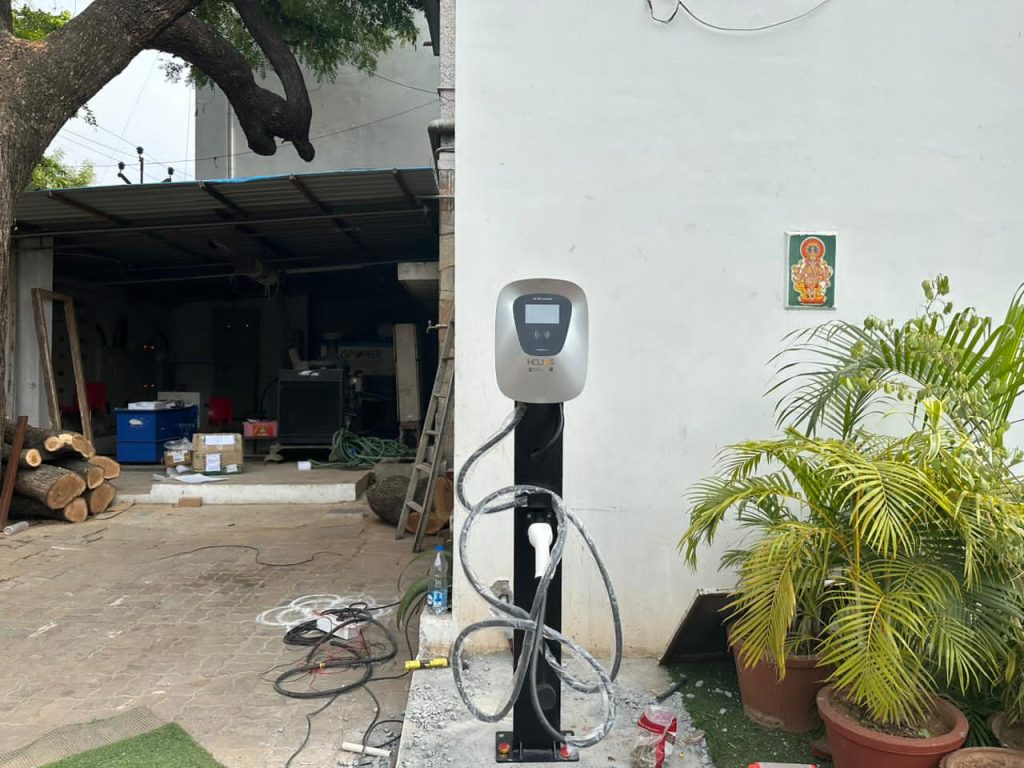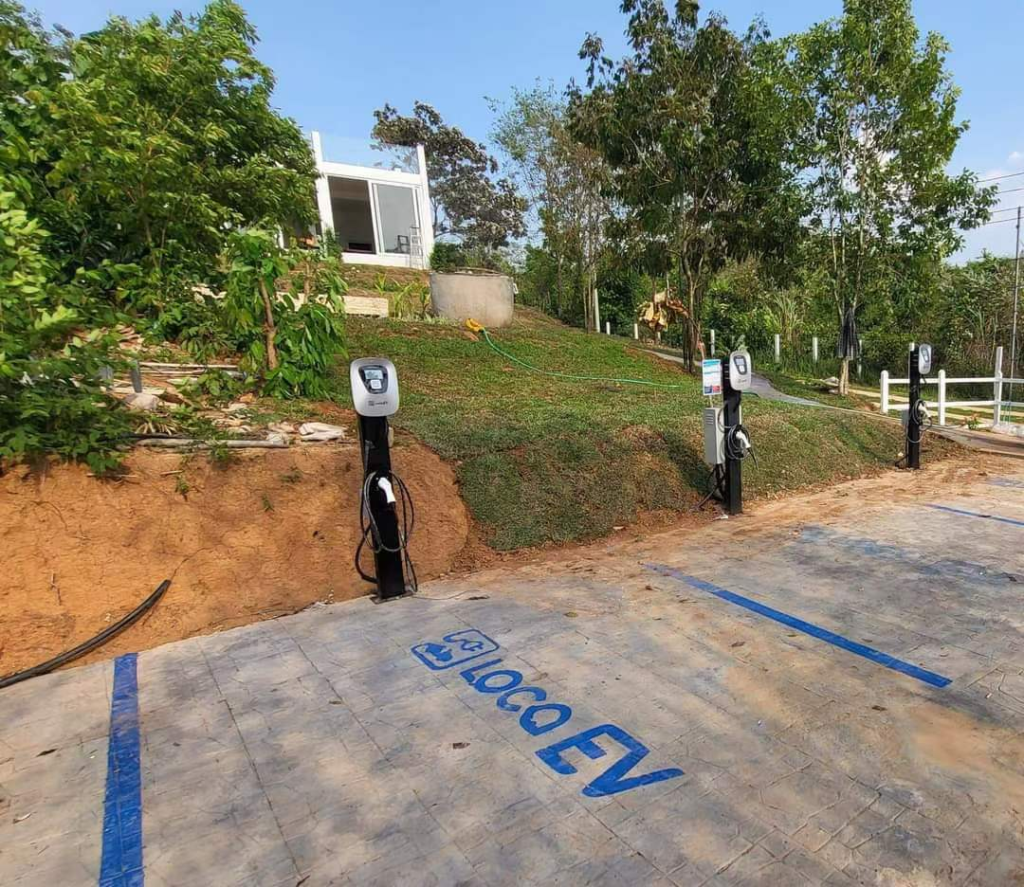
Products
Fast, Reliable, Everywhere

Solutions
Efficient, Innovative EV Charging Solutions.
News
We are committed to the innovation and application of EV charging.
In the rapidly evolving electric vehicle (EV) market, alternating current electric vehicle chargers (AC EV Chargers) play a crucial role in the proliferation and development of electric vehicles. Compared to direct current chargers, AC chargers offer several advantages, making them the preferred choice for many vehicle owners and businesses. In this article, we will explore the top advantages of AC EV Chargers, providing you with unique insights and professional content.

When it comes to electric vehicle (EV) charging, the cost-effectiveness of AC EV chargers is a major consideration. Let's delve into the data-backed reasons why AC EV chargers are a financially savvy choice for both individuals and businesses.
AC EV chargers, particularly Level 1 and Level 2 chargers, boast a significantly lower initial investment compared to their DC fast charging counterparts. To illustrate this cost difference, let's look at the average costs associated with each type of charger:
| Charger Type | Initial Investment Cost |
| Level 1 AC EV Charger | $300 - $600 |
| Level 2 AC EV Charger | $400 - $1,200 |
| DC Fast Charger | $10,000 - $40,000 or more |
This cost disparity makes AC EV chargers a more accessible option for individuals looking to install a home charging station or businesses seeking to deploy charging infrastructure. The lower upfront cost of AC EV chargers can help accelerate the adoption of electric vehicles by reducing the financial barrier to entry.
In addition to their lower purchase price, AC EV chargers also offer cost savings in terms of installation. The installation of AC EV chargers is generally less complex and expensive than that of DC fast chargers, primarily due to the lower electrical infrastructure requirements.
The following table summarizes the key differences between these charger types:
| Charger Type | Voltage | Electrical Upgrades Required | Ease of Installation |
| Level 1 Chargers | 120 volts | Minimal | Easy |
| Level 2 Chargers | 240 volts | Dedicated circuit may be required | Moderate |
| DC Fast Chargers | High voltage | Extensive modifications required | Difficult |
AC EV chargers offer a cost-effective solution for home charging, allowing EV owners to take advantage of lower electricity rates during off-peak hours. According to data from utility providers, off-peak electricity rates can be as much as 50% lower than peak rates, resulting in significant savings for EV owners who charge their vehicles overnight.
Moreover, AC EV chargers enable homeowners to manage their charging costs more effectively by scheduling charging sessions during times of the day when electricity rates are lowest. This level of control over charging costs can help offset the initial investment in the charger and make electric vehicle ownership more affordable in the long run.
In conclusion, the data clearly supports the cost-effectiveness of AC EV chargers, making them a compelling choice for individuals and businesses looking to embrace electric vehicle technology. With lower initial investment costs, affordable installation, and the ability to take advantage of off-peak electricity rates, AC EV chargers offer a practical and economical solution for EV charging needs.
AC EV chargers are pivotal in making electric vehicle (EV) ownership seamless and practical. They offer unparalleled convenience and accessibility, aligning with the evolving needs of modern transportation. Let's delve into the key advantages that set AC EV chargers apart:
AC EV chargers are designed to integrate seamlessly with standard electrical infrastructure. This compatibility ensures that they can be easily installed in various locations, including residential areas, workplaces, and public spaces. The simplicity of installation makes them a versatile choice, enhancing the accessibility of EV charging for all users.
Unlike their DC counterparts, AC EV chargers offer flexibility in installation locations. They can be conveniently installed in a wide array of settings, ranging from parking garages to private residences. This flexibility empowers EV owners to choose the most convenient location for charging, catering to their individual needs and preferences.
One of the standout features of AC EV chargers is their ability to facilitate overnight home charging. By leveraging off-peak electricity rates, EV owners can charge their vehicles efficiently and cost-effectively. This overnight charging capability ensures that EVs are ready for use each morning, eliminating the inconvenience of searching for public charging stations.
In conclusion, AC EV chargers epitomize convenience and accessibility in the realm of electric vehicle charging. Their widespread infrastructure compatibility, flexible installation options, and ability to facilitate overnight home charging make them an indispensable component of the EV ecosystem.
AC EV chargers are instrumental in enhancing the efficiency and speed of electric vehicle (EV) charging, offering a range of benefits that cater to the needs of EV owners. Let's explore how AC EV chargers achieve this:
AC EV chargers are designed to optimize charging times, ensuring that EV owners can quickly and efficiently charge their vehicles. With advanced charging algorithms, AC EV chargers can intelligently manage the charging process, minimizing charging times and maximizing the convenience for EV owners.
One of the key advantages of AC EV chargers is their ability to support Level 2 charging. Level 2 chargers operate at a higher voltage than standard Level 1 chargers, allowing for faster charging times. This makes Level 2 chargers ideal for EV owners who need to quickly charge their vehicles and get back on the road.
AC EV chargers can integrate seamlessly with smart charging technologies, further enhancing their efficiency and speed. Smart charging technologies allow EV owners to schedule charging times, monitor charging progress, and even remotely control the charging process. This level of control and automation ensures that EV owners can efficiently manage their charging needs.
AC EV chargers play a crucial role in enhancing the efficiency and speed of EV charging. With optimized charging times, support for Level 2 charging, and integration with smart charging technologies, AC EV chargers are a valuable asset for EV owners looking to streamline their charging experience.
AC EV chargers offer significant environmental benefits, aligning with the global shift towards sustainable transportation. Let's explore how AC EV chargers contribute to a greener future:
One of the most significant environmental benefits of AC EV chargers is the reduction in greenhouse gas emissions. By using electricity instead of gasoline, electric vehicles charged with AC EV chargers produce zero tailpipe emissions. This helps improve air quality and reduce the carbon footprint associated with transportation.
AC EV chargers are highly energy-efficient, converting a high percentage of the electrical energy into usable energy for charging electric vehicles. This efficiency not only reduces overall energy consumption but also minimizes waste and environmental impact.
For example, Pilot X Piwin's AC EV Chargers installed in the picturesque landscapes of rural America are powered by solar panels, blending seamlessly with the natural environment. These chargers not only reduce greenhouse gas emissions but also demonstrate the feasibility and benefits of renewable energy integration in less urbanized areas.

AC EV chargers play a crucial role in promoting the integration of renewable energy sources, such as solar and wind power, into the grid. By charging electric vehicles with renewable energy, AC EV chargers help reduce reliance on fossil fuels and support the transition to a cleaner energy mix.
AC EV chargers offer significant environmental benefits, including reduced greenhouse gas emissions, improved energy efficiency, promotion of renewable energy integration, and noise reduction. By adopting AC EV chargers, we can move towards a more sustainable transportation system and help protect the environment for future generations.
AC EV chargers are not just about efficient charging; they also significantly enhance the overall user experience and service for electric vehicle (EV) owners. Let's delve deeper into how AC EV chargers achieve this:
Enhanced Safety and Security
AC EV chargers prioritize safety and security, offering advanced features such as surge protection, overcurrent protection, and ground fault detection. These features ensure the safety of both the EV owner and the charging equipment. Additionally, some AC EV chargers include security features like user authentication and tamper detection to prevent unauthorized access and ensure the security of the charging infrastructure. These safety and security measures provide peace of mind to EV owners, enhancing their overall charging experience.
Improved Charging Efficiency and Remote Monitoring
AC EV chargers are designed to improve charging efficiency, reducing charging times and maximizing the use of renewable energy sources. They achieve this through optimized charging algorithms and power management systems. Furthermore, many AC EV chargers offer remote monitoring and management capabilities, allowing EV owners to monitor their charging status and manage their sessions from anywhere. This feature not only enhances user convenience but also helps users optimize their charging patterns for cost-effectiveness.
AC EV chargers offer enhanced charging convenience with flexible installation options, easily fitting into various locations like homes, workplaces, and public areas. This accessibility ensures that EV owners can conveniently access charging facilities wherever they go. Additionally, many AC EV chargers are equipped with user-friendly interfaces, including touchscreen displays and intuitive controls, making them easy to operate for EV owners. These features, combined with smartphone integration for remote monitoring and control, ensure a seamless and convenient charging experience for users.
In conclusion, AC EV chargers play a crucial role in improving user experience and service for EV owners. With enhanced charging convenience, user-friendly interfaces, improved charging efficiency, remote monitoring capabilities, and enhanced safety and security features, AC EV chargers are essential components of a modern and user-centric EV charging infrastructure.
AC EV chargers are essential for the widespread adoption of electric vehicles due to their cost-effectiveness, convenience, and efficiency. They offer lower initial investment and affordable installation costs compared to DC fast chargers, making them ideal for homes, workplaces, and public areas. Additionally, AC EV chargers enhance user experience with user-friendly interfaces, remote monitoring, and safety features. As the demand for electric vehicles grows, AC EV chargers will continue to play a crucial role in supporting sustainable transportation.
